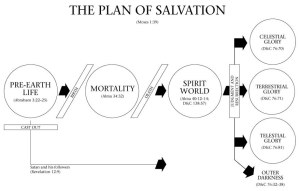When I was 10 or 11 years old, I remember a Sunday School lesson on "the Plan of Salvation." It was the first time I saw a visual representation of this unique doctrine of the Church of Jesus Christ of Latter-day Saints. It looked something like this:
Although I encourage you to take the time to study this doctrine more carefully from official sources, the basic idea is that before we were born, we lived with our Heavenly Father as His spirit children. He presented a plan to us, whereby we would have the opportunity to gain a body and to progress and become more like Him. It involved being born – forgetting our Father and our life together with Him – and experience the challenges and joys of mortality, and make choices for ourselves in a realm outside of the powerful influence of our good and perfect Father. After death, our spirits would go to a "spirit world," to await a judgment of our choices and desires relative to the knowledge and opportunities we had in life. This judgment would determine which of three kingdoms we would enter for eternity: the celestial, terrestrial, or telestial. Not shown above, but illustrated in the lesson I remember, was that the celestial kingdom was portrayed as a sun; the terrestrial, a moon; and the telestial as stars. There was also a destination called "outer darkness," where only the worst of the worst would go.
This plan was very intriguing to my 10-year old mind. In fact, as I have learned more about its intricacies over the years since, it has only become more so. It is much more than just a simplistic heaven or hell, but an intelligent and fair explanation for who we are, why we are here, and what happens after death. If this is the first time you are hearing about these ideas, I'm not sure what your reaction is, but my initial reaction was one of wonder and amazement. I believe that the Holy Ghost gave my young heart a testimony of the truth and goodness of this doctrine, and I have never come across any theology that equals the beauty and simplicity of it.
If there is a flaw in this diagram, it is that is glosses over the central role of Jesus Christ in making this plan possible. You see, in allowing us to come to an environment away from Himself where we would be subject to both good and evil influences, God knew we would make mistakes and wrong choices. He knew that we had to have this freedom – or agency as it is called – to choose for ourselves or we would not be able to develop our character and become more like He is. The problem is, that even one wrong act would render us imperfect and unworthy to return to the holy presence of God. So our Heavenly Father sent His Only Begotten Son, Jesus Christ, to be born just like we were, to experience the trials and vicissitudes of mortality just like us, to suffer temptation like we do, but never to yeild to it, always honoring His Father. When the time came, "the Lord ... laid on Him the iniquity of us all" (Isaiah 53:6), whereby "God himself atoneth for the sins of the world, to bring about the plan of mercy, to appease the demands of justice, that God might be a perfect, just God, and a merciful God also" (Alma 42:15).
Jesus explained what we must do to receive His grace and the gift of forgiveness:
And no unclean thing can enter into his kingdom; therefore nothing entereth into his rest save it be those who have washed their garments in my blood, because of their faith, and the repentance of all their sins, and their faithfulness unto the end.
Now this is the commandment: Repent, all ye ends of the earth, and come unto me and be baptized in my name, that ye may be sanctified by the reception of the Holy Ghost, that ye may stand spotless before me at the last day.
This is the gospel, the "good news." This is what I believe, and looking back I can see how God has been re-teaching me some of the many things I once knew when I sat at His knee.
